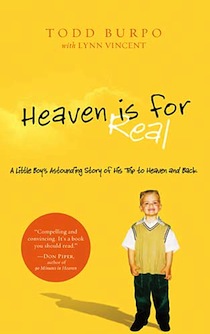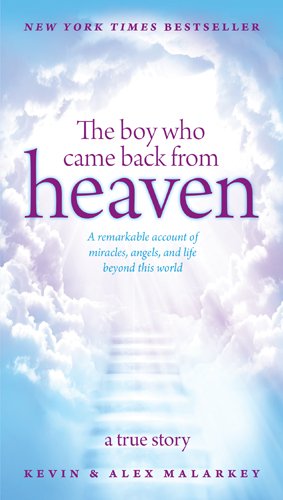Retailer and Publisher Pull ‘The Boy Who Came Back From Heaven’
Lifeway Christian Stores is pulling at least one “Heaven tourism” book after its coauthor condemned it as fiction.
Almost immediately, publisher Tyndale House also announced it would stop selling the book.
This all started when Alex Malarkey, whose name is on the front of The Boy Who Came Back from Heaven, directly rebuked his own part of the story in exactly the fashion “Heaven tourism” critics would expect in their most idealistic dreams.
I did not die. I did not go to Heaven.
I said I went to heaven because I thought it would get me attention.
He went even further and stated an affirmation of the Christian doctrine of sola Scriptura.
When I made the claims that I did, I had never read the Bible. People have profited from lies, and continue to. They should read the Bible, which is enough. The Bible is the only source of truth. Anything written by man cannot be infallible.1
Pastor Phil Johnson with Grace to You Ministries clarified that this follows months of efforts by Alex Malarkey and his mother, Beth Malarkey.
She and Alex had already been doing everything they could to get the word out that The Boy Who Came Back from Heaven told a largely imaginary story, and that most of the details had been greatly embellished and exaggerated in the writing. Publicity about the book had incited a cult of afterlife enthusiasts and hangers-on who wanted to canonize Alex and idolize him as a mystical seer with an open connection to heaven.
Johnson characterizes The Boy Who Came Back from Heaven as largely the work of Alex’s father, Kevin Malarkey. Johnson also clarifies that this is not the first time the two Malarkeys, Alex and Beth, have stood against the one Malarkey, Kevin the book’s author.
As for me — this makes me curious to obtain the book along with its more-popular cousin, Heaven Is For Real.
But it sounds like the latter book’s authors at least had better and more Gospel-inclusive motivations for sharing what they sincerely believe is Colton Burpo’s firsthand true-story experience of visiting Heaven and seeing Jesus.
Quick thoughts:  ‘Heaven tourism’ books do not help Christians
‘Heaven tourism’ books do not help Christians
Previously I’ve been over some of this. But I have several main objections to the “Heaven tourism” books.
First is the “sufficiency of Scripture” response — though with the disclaimer that people could theoretically have near- or after-death experiences without automatically challenging Scripture or its sufficiency. But Christians must know that Scripture should easily pwn all such anecdotes.
Second, these books draw far too much attention to the present-day Heaven — which is an amazing place, don’t get me wrong — and act like that’s the Christian’s final destination. It absolutely unequivocally is not the Christian’s final destination. Jesus Christ has instead promised to renew Earth, the physical creation, and touch Heaven down here (Rev. 21:1-2). Then “the dwelling of God [will be] with man” (Rev. 21:3).
Third, from what I have so far seen, most of these books contain profuse amounts of sentimental silliness and even anti-biblical notions. Even Heaven Is For Real recounts some details that sound suspiciously like a child making stuff up — and I don’t think some well-meaning young parents know how imaginative children can be.
Fourth, there’s nothing wrong about anticipating God’s afterlife or even speculating (with Scriptural parameters) what this life will be like. But it’s dangerous to put our speculations in a book and call it “nonfiction” without clarifying that these are speculations and imaginations.2 So this objection is about genre labeling as much as it is about making sure our own imaginations are not being put on the same level as God’s holy word.
Fifth, it’s alarming how much people want to cling to their nonsense beliefs even when the very author of those beliefs is now disclaiming them. As Johnson notes, “When Alex has tried to make similar statements on Facebook or in other online forums, he has been routinely shouted down, his comments deleted, and his fragile voice silenced.” More than likely this will continue even after stores and publishers — better late than never — are pulling their own product. And that’s where the main problem is: not first that authors and publishers are making these books or that publishers are printing them, but that too many people want to believe them.
Sixth, the fact that someone wrote a fictitious “Heaven tourism” account and had the surname Malarkey proves that God, for whatever His reasons in providentially allowing this sort of thing to go on, occasionally has a stinging (if not cliched) sense of humor.
Those are my thoughts. What do you think?
- “The Boy Who Came Back from Heaven” Recants Story, Rebukes Christian Retailers, PulpitandPen.org, Jan. 13, 2015. A brief note about the wording: the doctrine of sola Scriptura or the sufficiency of Scripture does not necessarily mean that “the Bible is the only source of truth.” Rather, this doctrine holds that the Bible is God’s final and only direct truth-revelation about Himself and His Story of redemption, and is entirely without error. By contrast, all other truth-reflections in the world are at best echoes of His truth and contain some error. ↩
- For example, Randy Alcorn in Heaven offers a biblically grounded survey of Scripture’s promises about not only Heaven, but the future New Heavens and New Earth. When he does speculate about, say, spaceships and dinosaurs on New Earth, he is very careful to keep this imaginations in line with Scripture. He is also careful that these do not distract from New Earth’s chief feature, Jesus Christ. ↩










































You’re funny! …and I couldn’t agree more!
Yes, I saw this on Jordan Hall’s Facebook page. While I honestly was only able to peruse this piece briefly Stephen, it appears we agree.
Please check your inbox.
You nailed it. I’m happy to hear that the “Malarkeys” came clean … and agree that God must be amused by our attempts to guess at the details of what lies beyond. I enjoyed Alcorn’s Heaven book as well and agree with your take on HIFR. While my father was dying someone gave me a copy of HIFR and I couldn’t get through the first few chapters without feeling a twinge of my gag reflexes. I think many people find comfort in imagining loved ones immediately passed into their glorified bodies. Books like these, unfortunately, set Christians back in their credibility and trustworthiness.
My whole thoughts on this subject, after I became convinced this whole thing wasn’t a joke.
🙂
I haven’t read the book, but the HIFR flick was pure undiluted new age screwballery at it’s worst.
Yes, to everything you said. Those are the reasons I don’t read those types books. As Christians, our attention is better focused elsewhere.
… Such as discerning and enjoying fiction as fiction, as part of God-worship.
One reason too many readers (including Christians) keep slurping up fairy tales and myths like this is that they don’t know how to handle fairy tales and myths. So we label them, “A true story!” and stick ’em under Inspirational.
Sadly there’s a lot of parallels to past examples. One big example was the satanist testimonies of a lot of people in the eighties. Cornerstone Magazine debunked comedian Mike Warnke’s account of being an ex-satanist, and Lauren Stratford was also debunked. A lot of Pentecostal and fundamentalist prophecies, often in specific detail, were like this too; read “The Late Great Planet Earth” by Hal Lindsey, any of Lester Sumrall’s prophetic books, or Pat Robertson’s “The New World Order” for examples.
A lot of people seem to want more assurance than faith can provide, and become vulnerable to things like this. I think sometimes we give too little attention to faith being a cross, and being hard at times. Yeah, to a rationalist mindset this is unscriptural and harmful, but in the sense of people carrying their crosses day to day, it’s like lusting after a cup of water offered to you, only to find it’s mixed with vinegar. I can’t blame them, even as I know how harmful it is.
Seriously? The author’s name is Malarkey? You can’t make this stuff up….
….well, apparently you CAN, and rake in a bunch of money from unsuspecting dupes. Are they offering money back to those who bought the book thinking it was a “true” story? I suspect not…..
And what is the publisher’s responsibility with all this? It all sounds like a money-grab attempt on the part of Tyndale House after seeing the success of Heaven is For Real. Shame on all of them, I say.
To be fair though I think Malarkey’s book came before HIFR.